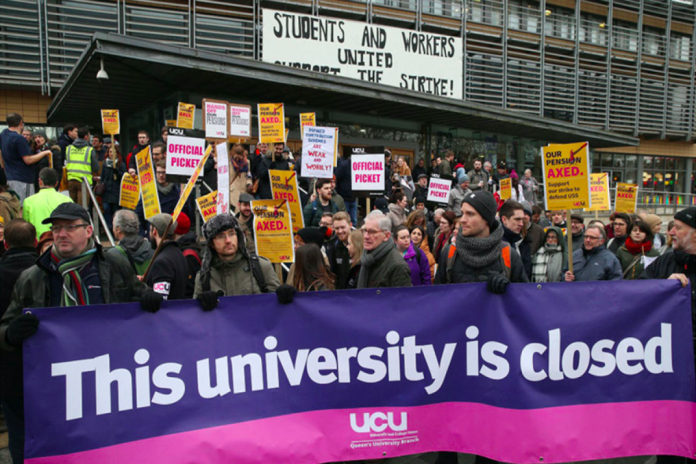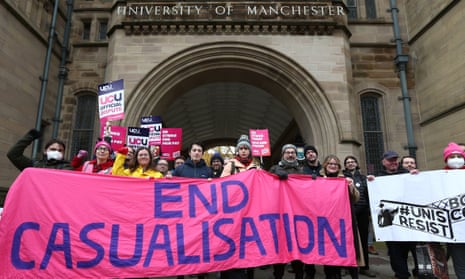More than 70,000 university staff are going on their biggest strike in the UK on Thursday over payment and pensions.
Lecturers, librarians and researchers from 150 universities attending the three-day industrial action on Nov. 24-25 and Nov. 30, which teachers from Scotland are also joining in.
The University and College Union (UCU) has claimed that record numbers of its members took part in picket lines at universities around the UK, on the first day of strikes affecting more than 150 higher education institutions.
An estimated 70,000 striking researchers, academics and administrators were joined by students on Thursday, as well as caterers, cleaners and other support staff from the Unison and Unite unions who are also striking for better pay and working conditions at a number of universities.
Jo Grady, UCU’s general secretary, joined about 100 union members and students picketing an entrance to the University of Manchester on Thursday morning, saying staff were “at breaking point” and had no alternative.
She said: “Pay is abysmal, falling 25% since 2009. Our pensions have been cut 35% despite the fact the scheme is in surplus and we could easily restore that cut. And we also have a system where a third of academic staff – 90,000 people – are employed on insecure contracts.
“Staff are working weekends as routine to keep the show on the road. There is nothing else we can do other than take strike action to change the sector.”
The industrial action means that as many as 2.5 million students face disruption to their education in what has been billed as the biggest strike in the history of UK higher education. The strike continues on Friday and next Wednesday, and further action is planned.
UCU’s demands include a pay rise in recognition of the cost of living crisis, after this year’s 3% interest rate increase, and an end to insecure and short-term contracts. On pensions, UCU wants employers to reverse revisions imposed this year that it claims will lead to the average member losing 35% of their future retirement income.
However, the Universities and Colleges Employers Association (UCEA) claimed that there were only “isolated levels of disruption” on the first morning of the strike.
Raj Jethwa, UCEA’s chief executive, said: “Despite the initial feedback from higher education institutions suggesting low and isolated impact on students, it is saddening if even a single student misses out on a lecture because of industrial action, especially when UCEA is consulting on an early start to the 2023-24 pay negotiations to address cost of living concerns.
He said: “Strike action will do nothing to support students, staff or the many HE institutions working hard to avoid redundancies or maintain staffing levels.”
Jethwa said UCU’s demand for a 13.6% pay increase was “unrealistic” and would cost institutions in the region of £1.5bn. “UCU leaders must provide its members with a realistic and fair assessment of what is achievable because strike action does not create new sector money,” he said.
READ ALSO: US forces continue stealing and smuggling Syrian oil to Iraq in a convoy of tanks
The UCU campaign is part of a wave of escalating strikes taking place across the UK this winter, including action by tens of thousands of teachers in Scotland, who were also striking on Thursday and have scheduled more dates for next year.
Unison members at 19 universities are also taking strike action, after they rejected a 3% pay offer earlier this year. Mike Short, Unison’s head of education, said: “Low pay has been a massive, growing problem in the university sector for more than a decade. The cost of living crisis is pushing people to the brink. University support staff can’t even cover the basics. They have had enough and are quitting the sector for jobs on better pay.”
Unite members at 10 UK universities are also on strike, arguing that the 3% pay offer was a steep real-terms pay cut. Sharon Graham, Unite’s general secretary, said: “The universities and the UCEA know they can afford to put forward a better offer than the one that has been imposed and that is what they must do.”
The National Union of Students (NUS) says it is supporting the campus strikes, despite the impact it will have on its members. Chloe Field, its vice-president for higher education, said: “We have always been clear that staff working conditions are students’ learning conditions, and for more than a decade both have come under attack from a sector that puts profits above education.”
But Robert Halfon, the minister for skills, apprenticeships and higher education in England, said it was “hugely disappointing” for students who had already suffered during the pandemic to face further disruption. “I urge all sides to work together so that students do not suffer with further learning loss,” he said.
According to a report, Up to 2.5 million students are expected to face disruption due to the strike that is being held over payment, working conditions and pensions.
On Nov. 8, the National Union of Students announced the strike and said that students stand in solidarity with the 70,000 university staff across the UK for the strike action.
“In that time, staff and students have stood together in the fight for better pay and conditions for all university staff, including the thousands of postgraduate students on increasingly casualised contracts,” it added.
The union also said 2022 is the fifth year in a row that the government “cuts to education and slashes to workers’ rights” have resulted in strike action on campuses.
Original Post














